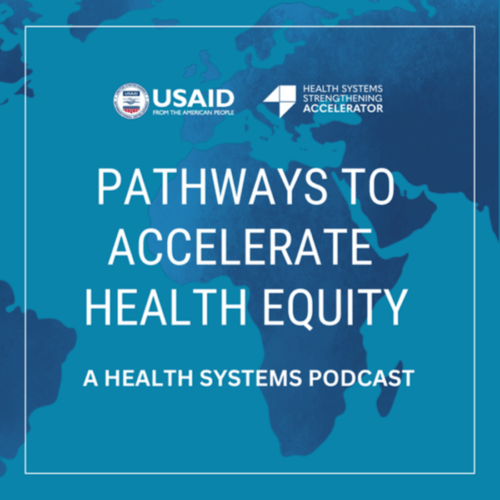
Pathways to Accelerate Health Equity is a three-part podcast that shares insights from the R4D-led USAID Health Systems Strengthening Accelerator about building resilient, high-performing health systems that benefit vulnerable populations in low- and middle-income countries. Host Nathan Blanchet talks with change agents — doctors, academics, researchers and government officials — who are working to foster more equitable health systems in their countries to hear what they’ve learned through their work.
Episode 1: To Improve Health Equity, Listen Better and Address the Costs of Healthcare
Dive into the first 30-minute episode of our podcast series as we explore pathways to accelerate health equity. In Episode 1, USAID’s Jodi Charles talks about the importance of inviting a variety of voices to the table — and thoughtfully engaging them — when designing solutions to address health equity. Dr. Jean-Paul Dossou, a medical doctor, R4D board member and the CEO of CERRHUD, a health research and implementation organization in Benin, talks about the complexities of implementing pro-poor health policies, such as eliminating user fees that patients pay at the point of service.
Episode 2: Implementation Research Is a Tool for Enhancing Health Equity
Episode 2 of Pathways to Accelerate Health Equity delves into the critical role of implementation research in ensuring health policies designed to promote equity are truly making a difference. In this 25-minute episode, Dr. Dzakpasu of the Ghana Health Service and Dr. Delamou, a public health professor at Gamal University in Guinea, join host Nathan Blanchet to discuss the power of community feedback in assessing whether efforts to reach remote populations are effective — and if not, why.
Episode 3: For More Equitable Health Systems, Involve Civil Society
In the final, 32-minute episode of the podcast, we share more best practices for achieving health equity. This time we’re taking a closer look at how government officials can productively engage with civil society organizations (CSOs) — and how CSOs can better advocate on behalf of the communities they represent. Dr. Kéfilath Bello, the deputy director at CERRHUD, talks about how creating space for government officials and CSOs to engage in Togo has helped fostered greater accountability related to government efforts plans and given CSOs more legitimacy. R4D’s Benin Country Director Conrad Tonoukouen talks about how this kind of engagement helps government officials — who are sometimes far removed from the communities they hope to serve — better understand and respond to the realities on the ground. And Molly Lauria of ICF talks about a new tool developed to help CSOs in Guinea better understand recent community health policy changes and how to advocate for their priorities within local budget processes.
The Accelerator was a global initiative funded by the United States Agency for International Development (USAID) with co-funding from the Bill & Melinda Gates Foundation. It was led by Results for Development (R4D) with core partners Health Strategy and Delivery Foundation (HSDF) and ICF.













